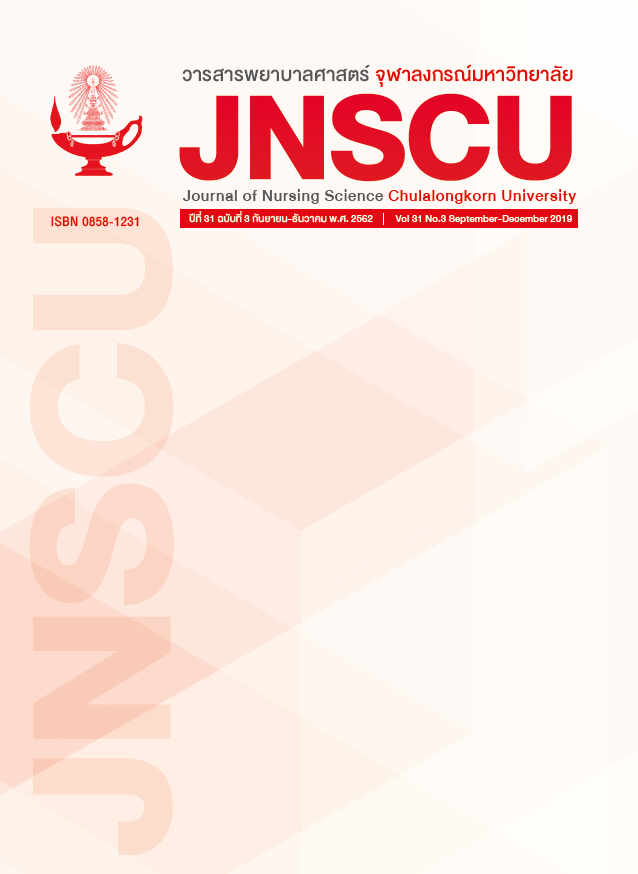ผลของโปรแกรมส่งเสริมการดูแลตนเองต่อพฤติกรรมการดูแลตนเอง ภายหลังการผ่าตัดลดน้ำหนักของผู้ป่วยโรคอ้วน
Main Article Content
บทคัดย่อ
วัตถุประสงค์: 1) เพื่อศึกษาพฤติกรรมการดูแลตนเองภายหลังการผ่าตัดลดน้ำหนักของผู้ป่วยโรคอ้วน ภายหลังได้รับโปรแกรมส่งเสริมการดูแลตนเอง และ 2) เพื่อเปรียบเทียบพฤติกรรมการดูแลตนเองภายหลังการผ่าตัดลดน้ำหนักของผู้ป่วยโรคอ้วน ระหว่างกลุ่มที่ได้รับโปรแกรมส่งเสริมการดูแลตนเองกับกลุ่มที่ได้รับการพยาบาลตามปกติ
แบบแผนงานวิจัย: การวิจัยแบบกึ่งทดลอง
วิธีดำเนินการวิจัย: กลุ่มตัวอย่างคือ ผู้ป่วยโรคอ้วนทั้งเพศชายและหญิง อายุ 18–59 ปี ภายหลังได้รับการผ่าตัดลดน้ำหนักที่โรงพยาบาลจุฬาลงกรณ์ จำนวน 30 คน แบ่งเป็นกลุ่มควบคุมและกลุ่มทดลอง กลุ่มละ 15 คน จับคู่ด้วยเพศ อายุ และชนิดการผ่าตัด กลุ่มควบคุมได้รับการพยาบาลตามปกติ กลุ่มทดลองได้รับโปรแกรมส่งเสริมการดูแลตนเอง ที่ผู้วิจัยสร้างขึ้นตามกรอบแนวคิดทฤษฎีการดูแลตนเองของ Orem ร่วมกับแนวทางการบำบัดรักษาผู้ป่วยโรคอ้วนภายหลังการผ่าตัดลดน้ำหนัก ประกอบด้วย 2 ระยะ คือ 1) ระยะการให้ความรู้และการสนับสนุนภายหลังการผ่าตัดขณะอยู่โรงพยาบาล และ 2) ระยะการให้การสนับสนุนเมื่อกลับบ้าน เก็บรวบรวมข้อมูล 8 สัปดาห์ ด้วยแบบวัดพฤติกรรมการดูแลตนเองภายหลังการผ่าตัดลดน้ำหนัก มีค่าสัมประสิทธิ์แอลฟ่าครอนบาคเท่ากับ .81 วิเคราะห์ข้อมูลด้วยสถิติเชิงพรรณนาและสถิติทดสอบที
ผลการวิจัย:1) ผู้ป่วยโรคอ้วนภายหลังได้รับการผ่าตัดลดน้ำหนักกลุ่มที่ได้รับโปรแกรมส่งเสริมการดูแลตนเอง มีพฤติกรรมการดูแลตนเองอยู่ในระดับดี (Mean = 4.13± SD. = 0.25) และ 2) ผู้ป่วยโรคอ้วนภายหลังได้รับการผ่าตัดลดน้ำหนัก กลุ่มที่ได้รับโปรแกรมส่งเสริมการดูแลตนเองมีพฤติกรรมการดูแลตนเอง (Mean = 4.13 ± SD. = 0.25) ดีกว่ากลุ่มที่ได้รับการพยาบาลตามปกติ (Mean = 3.68 ± SD. = 0.31) อย่างมีนัยสำคัญที่ระดับ .05
สรุป: โปรแกรมส่งเสริมการดูแลตนเองนี้ ควรนำไปประยุกต์ใช้เพื่อส่งเสริมพฤติกรรมการดูแลตนเองภายหลังการผ่าตัดลดน้ำหนักให้กับผู้ป่วยโรคอ้วน
Article Details
ลิขสิทธิ์ของบทความที่ตีพิมพ์เป็นของวารสารพยาบาลศาสตร์ จุฬาลงกรณ์มหาวิทยาลัย ทั้งฉบับตีพิมพ์เป็นรูปเล่มและเอกสารออนไลน์
References
Nightingale CE, Margarson MP, Shearer E, Redman JW, Lucas DN, Cousins JM, et al. Guidelines Peri-operative
management of the obese surgical patient 2015. Anesthesia 2015; 70(7): 859-76.
Weingarten TN, Flores AS, McKenzie JA, Nguyen LT, Robinson WB, Kinney TM, et al. Obstructive sleep apnoea and perioperative complications in bariatric patients. BJA: The British Journal of Anaesthesia 2011; 106(1): 131-9.
Driscoll S, Gregory DM, Fardy JM, Twells LK. Long-Term Health-Related Quality of Life in Bariatric Surgery Patients: A Systematic Review and Meta-Analysis. Obesity 2016; 24(1): 60-70.
Doolen JL, Miller SK. Primary care management of patients following bariatric surgery. Journal of the American
Academy of Nurse Practitioners 2005; 17(11): 446-50.
Zhang L, Tan WH, Chang R, Eagon JC. Perioperative risk and complications of revisional bariatric surgery compared to primary Roux-en-Y gastric bypass. Surgical Endoscopy 2015; 29(6): 1316-20.
Puchong Timrat. Bariatric and Metabolic Surgery: An Overview. In Theerapol Angkoolpakdeekul, Preeda Samlitpradit and Paisal Pongchailert, editors. Salayasardwiwat 44 (Surgery for Metabolic and Morbid Obesity). Bangkok:Bangkok Vejchasarn; 2011. (In Thai)
Medical Records of King Chulalongkorn Memorial Hospital. Data of Bariatric Surgery at Sirindhorn Operating Theatre King Chulalongkorn Memorial Hospital. King Chulalongkorn Memorial Hospital; 2016 1 Jan 2016 - 31 Aug 2016. (In Thai)
Kasama K, Mui W, Lee WJ, Lakdawala M, Naitoh T, Seki Y, et al. IFSO-APC consensus statements 2011. Obesity
surgery 2012; 22(5): 677-84.
Deitel M. Overview of operation for morbid obesity. World journal of surgery 1998;22(9): 913-8.
Bauchowitz A, Azarbad L, Day K, GonderFrederick L. Evaluation of expectations and knowledge in bariatric surgery patients. Surg Obese Relat Dis 2007;3(5): 554-8.
Aguilera M. Post-surgery support and the long-term success of bariatric surgery. Practice Nursing 2014; 25(9): 455-9.
Wykowski K, Krouse HJ. Self-Care Predictors for Success Post-Bariatric Surgery. Gastroenterology Nursing 2013; 36(2):129-35.
LePage CT. The lived experience of individuals following Roux-en-Y gastric bypass surgery: A phenomenological study. Bariatric Nursing and Surgical Patient Care 2010; 5(1): 57-64.
Sobhani Z, Amini M, Zarnaghash M, Hosseini SV, Foroutan HR. Self-Management Behaviors in Obese Patients Undergoing Surgery Base on General and Specific Adherence Scales. World journal of plastic surgery 2019; 8(1): 85-92.
Rudolph A, Hilbert A. Post-operative behavioural management in bariatric surgery: a systematic review and
meta-analysis of randomized controlled trials. Obesity reviews 2013; 14(4): 292-302.
McGrice M, Paul KD. Interventions to improve long-term weight loss in patients following bariatric surgery:
challenges and solutions. Diabetes, Metabolic Syndrome and Obesity: Targets and Therapy 2015; 8: 263-74.
Doi: 10.2147/DMSO.S57054.
Orem DE. Nursing: Concepts of Practice. 6thed. St. Louis: Mosby; 2001.
Srisa - Ard B. Basic Research. Bangkok: Suriyasan; 2018.
Bloom S, Hand book on Formative and Summative Evaluation of Student Learning. New York: Mc Graw-Hill Book Company; 1971.
Chaiyawat W. Orem's Self-care. In: Waraporn Chaiyawat and Jintana Yunibhand, editor. Nursing Theory. Bangkok: Chulalongkorn University; 2550.

